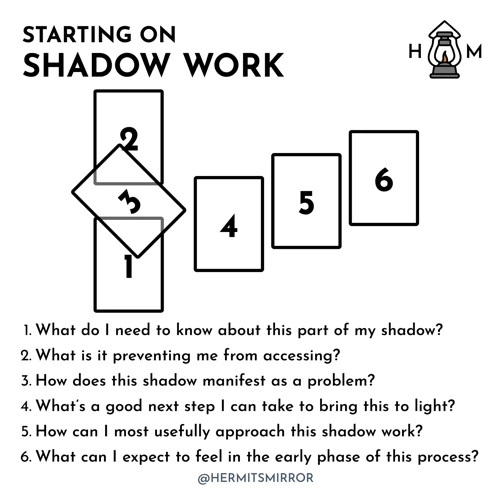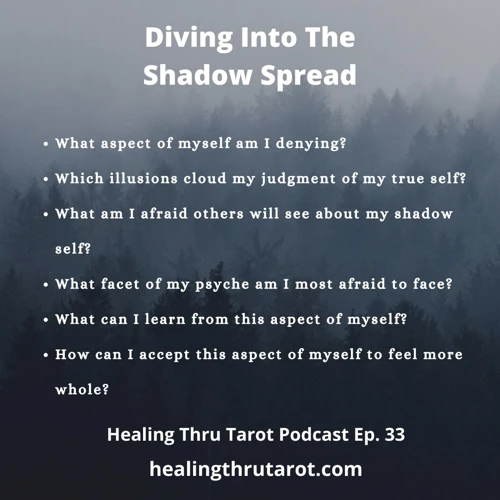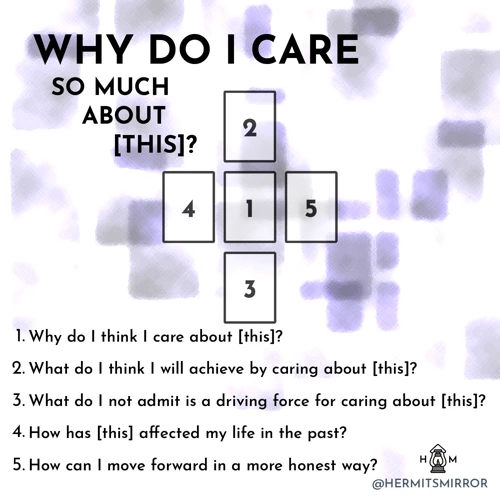Tarot for Shadow Work: Healing and Integration
Discover the transformative power of Tarot when it comes to shadow work – a profound method of healing and integration. In this article, we will dive into the concept of shadow work and how it can benefit your personal growth and well-being. We will explore how Tarot can be integrated into this practice, guiding you through the steps to select the right deck, create a sacred space, set intentions, and choose appropriate Tarot spreads. You will also learn how to interpret the Tarot cards specifically for shadow work, delving into the shadow aspects found in both the Major and Minor Arcana. We will discuss techniques for working through shadows, such as journaling, creating personalized rituals, and seeking professional guidance. Embark on a journey of self-discovery and transformation as you embrace the shadows with the guidance of Tarot.
Contents
- What is Shadow Work?
- Integrating Tarot into Shadow Work
- Interpreting the Tarot Cards for Shadow Work
- Working Through Shadows with Tarot
- Conclusion
-
Frequently Asked Questions
- What is the purpose of shadow work?
- Can shadow work be challenging?
- How can Tarot assist in shadow work?
- What are some common benefits of shadow work?
- How do I choose the right Tarot deck for shadow work?
- What is the significance of creating a sacred space for shadow work?
- How do I set intentions for a Tarot session focused on shadow work?
- What are some appropriate Tarot spreads for shadow work?
- How can I interpret the Tarot cards for shadow work?
- Is it necessary to seek professional guidance for shadow work?
- References
What is Shadow Work?

Shadow work is a profound and introspective practice that involves exploring the hidden or suppressed aspects of our psyche. Tarot practitioners often use this technique to delve deep into their subconscious minds and unearth the parts of themselves that they might have ignored, rejected, or denied. The term “shadow” refers to the aspects of our personality that we typically keep in the dark – the disowned parts, the unresolved emotions, and the unconscious patterns. Shadow work helps us to understand and integrate these shadow aspects, bringing them into the light of conscious awareness for healing and growth.
By shining a light on our shadows, we can gain a clearer understanding of our fears, insecurities, and negative behaviors. It allows us to confront the parts of ourselves that we might not be proud of and enables us to work through them, releasing emotional baggage and transforming ourselves in the process. Shadow work is not about self-judgment or blame, but rather about self-acceptance and self-compassion. It is an invitation to embrace all aspects of ourselves, both the light and the dark, and to find wholeness within.
Through shadow work, we can uncover deep-seated beliefs, traumas, and conditioning that have shaped our lives. It helps us to recognize patterns and behaviors that no longer serve us, allowing us to break free from self-limiting patterns and make conscious choices. By integrating our shadows, we gain a sense of empowerment, self-awareness, and a deeper connection with our true selves. Shadow work is a courageous and transformative journey that requires honesty, vulnerability, and a willingness to explore the depths of our being. So, grab your Tarot deck and embark on this profound inner exploration to discover the hidden gems within your shadow self.
Understanding the Shadow Self
Understanding the Shadow Self is essential for effective shadow work. The shadow self refers to the unconscious and hidden aspects of our personality that we tend to repress, deny, or disown. It contains the parts of ourselves that we find unacceptable or uncomfortable, such as our fears, insecurities, traumas, and negative emotions. By acknowledging and embracing our shadow, we can gain profound insight into ourselves and facilitate healing and integration. The shadow self often manifests through projection, where we unconsciously attribute our own disowned qualities onto others. It is important to remember that the shadow is not inherently negative or evil; it simply represents the parts of ourselves that have been suppressed. Exploring the shadow self can be done through various methods, such as exploring past lives with Tarot or harnessing the power of Tarot for self-empowerment. By embracing and integrating these shadow aspects, we can experience profound personal growth and transformation.
Benefits of Shadow Work
Shadow work offers a multitude of benefits that can enhance your personal growth and well-being. Here are some of the key advantages of engaging in this transformative practice:
1. Self-Awareness: Shadow work brings awareness to the parts of ourselves that we have disowned or hidden away. By acknowledging and accepting these shadow aspects, we gain a deeper understanding of who we truly are.
2. Emotional Healing: Exploring our shadows allows us to confront unresolved emotions and past traumas. By shining a light on these experiences, we can heal emotional wounds and alleviate inner pain.
3. Personal Growth: Shadow work opens the doors to personal growth and development. It enables us to break free from self-limiting beliefs and behaviors, paving the way for positive change and transformation.
4. Improved Relationships: Engaging in shadow work can greatly impact our relationships. By addressing our own shadows, we become more compassionate, empathetic, and understanding towards others, fostering healthier and deeper connections.
5. Increased Self-Confidence: As we integrate our shadows, we gain a sense of self-acceptance and self-love. This newfound confidence allows us to embrace our authentic selves and show up more authentically in the world.
6. Empowerment: Shadow work empowers us to take responsibility for our own growth and healing. It reminds us that we have the ability to create positive change in our lives and that we hold the power to shape our own destiny.
7. Alignment and Authenticity: By integrating our shadows, we align with our true selves, living a life that is authentic and in alignment with our values and passions.
8. Spiritual Awakening: Shadow work can be a catalyst for spiritual growth and awakening. As we explore the depths of our being, we connect with our spirituality on a deeper level, experiencing a sense of oneness and interconnectedness.
These are just a few of the many benefits that shadow work can bring into your life. By embracing this practice, you embark on a transformative journey of self-discovery, healing, and integration, ultimately leading to a more fulfilled and authentic existence.
Integrating Tarot into Shadow Work

Integrating Tarot into shadow work can be a powerful and insightful way to deepen your self-discovery journey. Here are some key steps to consider when incorporating Tarot into shadow work:
1. Selecting the Right Tarot Deck: Choosing a Tarot deck that resonates with you is essential for effective shadow work. Look for a deck that features imagery and symbolism that speaks to your subconscious mind and allows for a deeper exploration of your shadows. There are numerous decks available with varying themes and artistic styles, so take the time to find one that aligns with your intuition and personal preferences.
2. Creating a Sacred Space for Shadow Work: Before you embark on your Tarot shadow work session, create a dedicated space that promotes relaxation and focus. Clearing the space of any physical or energetic clutter and incorporating elements like candles, crystals, or incense can help set the right atmosphere for deep introspection and healing.
3. Setting Intentions for the Tarot Session: Before you begin your Tarot reading, set clear intentions for your shadow work. Consider what you hope to gain from the session, such as uncovering hidden patterns, healing past traumas, or gaining insight into subconscious blocks. This will help guide your focus and allow your intuition to align with the purpose of your shadow exploration.
4. Choosing Appropriate Tarot Spreads: Tarot spreads act as maps for guiding your exploration of specific themes or aspects of your shadow self. There are various spreads available that are specifically designed for shadow work. For example, the “What Shadows Need My Attention?” spread can help you identify the key areas that require healing and integration, while the “Embracing Your Shadows” spread invites you to dive deep into the aspects of self that you may have been avoiding or suppressing.
Taking the time to integrate Tarot into your shadow work practice can offer deep insights, guidance, and healing. The intuitive nature of Tarot allows you to uncover hidden truths and patterns, bringing light and understanding to your shadows. Remember to approach your shadow work sessions with an open heart and mind, allowing the Tarot cards to serve as mirrors reflecting the depths of your being.
Selecting the Right Tarot Deck
When embarking on shadow work with Tarot, selecting the right Tarot deck is crucial. Each Tarot deck has its own unique energy and visual symbolism, and finding one that resonates with you is essential for a meaningful shadow work experience. Consider your personal preferences and instincts when choosing a deck. Look for imagery and artwork that speaks to you on a deep level. Whether you prefer traditional Rider-Waite-Smith symbolism or are drawn to more modern or abstract interpretations, trust your intuition in selecting a deck that will support your journey. Some decks specifically designed for shadow work, such as the Shadowscapes Tarot or the Wild Unknown Tarot, may provide additional depth and insight for this purpose. Experiment with different decks and see which ones speak to your soul. Remember, there is no right or wrong choice when it comes to selecting a Tarot deck for shadow work; it is about finding the one that facilitates a strong connection and resonates with your innermost self.
Creating a Sacred Space for Shadow Work
To fully engage in shadow work, it is essential to create a sacred space that fosters a sense of safety, introspection, and connection. This sacred space will serve as a container for your exploration and allow you to dive deep into the shadows with a focused and open mindset.
Start by finding a quiet and comfortable area where you can be alone and undisturbed. Cleanse the space using smudging tools like sage or incense, or by simply opening a window to let fresh air in. This ritual of cleansing helps to clear any stagnant or negative energies.
Next, decorate your sacred space with items that evoke a sense of spirituality and introspection. You may choose to include candles, crystals, artwork, or meaningful objects that hold personal significance. These items act as anchors, creating a visual and energetic representation of the sacredness of the space.
Consider incorporating elements of nature into your sacred space. Plants, flowers, or natural materials can help establish a connection with the Earth and promote a sense of grounding.
To enhance the ambiance, you can play soft instrumental music or nature sounds in the background. This can help create a calm and serene atmosphere conducive to deep reflection.
Dim the lights or use candles to create a soft and gentle illumination. Candlelight has long been associated with introspection and can create a sense of sacredness and mystery.
Once your sacred space is set up, take a few moments to center yourself. Close your eyes, take deep breaths, and set your intention for your shadow work session. Allow yourself to enter into a state of receptivity and openness.
Remember, the goal of creating a sacred space is to invite a sense of reverence, focus, and connection to the divine or higher self. It is a personal and individual practice, so feel free to customize your space according to your preferences and intuition.
With a thoughtfully created sacred space, you can embark on your shadow work journey feeling supported, grounded, and ready to explore the depths of your psyche.
Setting Intentions for the Tarot Session
When it comes to shadow work with Tarot, setting clear intentions for each Tarot session is crucial. Setting intentions helps to focus your energy and direct the guidance provided by the Tarot cards towards your specific shadow work goals. Here are some steps to help you set intentions for your Tarot session:
1. Reflect on your shadow work goals: Take a moment to contemplate what specific aspects of yourself or situations you would like to explore or heal through shadow work. This could be addressing deep-seated fears, unresolved emotions, or patterns that you wish to transform.
2. Write down your intentions: Create a list of clear and concise intentions that align with your shadow work goals. For example, “I intend to gain insight into my fear of abandonment” or “I intend to explore the root causes of self-sabotaging behaviors.” Writing them down helps solidify your intentions and brings a sense of focus and commitment.
3. Set the mood: Create a sacred space for your Tarot session by lighting candles, burning incense, or playing soft music. This helps to create a calm and conducive environment for deep introspection and connection with your subconscious mind.
4. State your intentions: Before you begin your Tarot reading, take a moment to verbalize your intentions. Speak them out loud or silently in your mind, expressing your commitment to the process and inviting the Tarot cards to reveal the insights and guidance needed for your shadow work journey.
5. Visualize your intentions: Close your eyes and visualize yourself stepping into a space of healing and transformation. Envision yourself embracing and working through your shadow aspects with the guidance of the Tarot. This visualization helps to align your subconscious mind with your conscious intentions.
Remember, the power of intention lies in sincerity and clarity. By setting intentions for your Tarot session, you are opening yourself up to receive the wisdom and healing that the cards have to offer.
Choosing Appropriate Tarot Spreads
Choosing Appropriate Tarot Spreads
When integrating Tarot into shadow work, selecting the right Tarot spreads is essential for a focused and insightful reading. The choice of Tarot spreads can help structure the questions and provide a framework for exploring specific aspects of your shadow self. Here are a few considerations to keep in mind when choosing appropriate Tarot spreads:
1. Theme-based Spreads: Look for Tarot spreads that are specifically designed for shadow work or self-exploration. These spreads often have names like “Shadow Integration Spread” or “Uncover Your Shadows Spread.” They are designed to delve deep into your subconscious mind, uncover hidden truths, and provide guidance on how to integrate those aspects into your life.
2. Archetype Spreads: Consider using spreads that connect with archetypes or universal symbols associated with shadow work. For example, you may find spreads centered around the archetype of “The Shadow,” “The Inner Child,” or “The Trickster.” These spreads can help you gain insights into different aspects of your shadow self and how they manifest in your life.
3. Past-Present-Future Spreads: A simple yet powerful spread for shadow work is the traditional past-present-future spread. This spread allows you to examine how your past experiences and shadows have shaped your present circumstances and offer guidance on how to navigate the future. Each position in the spread can represent a different aspect of your shadow that you wish to explore.
4. Custom Spreads: Don’t hesitate to create your own custom spreads based on your specific shadow work intentions. You can design spreads that focus on specific areas of your life where you feel shadow aspects may be influencing your experiences. Remember to keep the questions open-ended and allow the Tarot cards to reveal insights and guidance.
Remember, the most important aspect of choosing appropriate Tarot spreads for shadow work is to align them with your intentions and what you wish to explore within your shadow self. Be open to experimenting with different spreads and adapting them to suit your unique journey of self-discovery and healing.
Interpreting the Tarot Cards for Shadow Work

Interpreting the Tarot Cards for Shadow Work
When it comes to using Tarot for shadow work, the interpretation of the cards takes on a deeper significance. Each Tarot card carries its own symbolism and meaning, and when applied to shadow work, they can serve as powerful tools for self-exploration and healing. Here are some approaches to interpreting the Tarot cards specifically for shadow work:
1. Exploring the Shadow Aspects in the Major Arcana: The Major Arcana cards represent significant life lessons and archetypal energies. When interpreting these cards for shadow work, pay attention to the darker or more challenging aspects portrayed in the imagery and symbolism. For example, The Tower card may indicate a sudden upheaval or breakdown, highlighting areas of your life where you resist change or hold on to unhealthy patterns. Use the insights from these cards to identify the shadows lurking within your subconscious mind.
2. Discovering Shadows in the Minor Arcana: While the Major Arcana cards hold profound meanings, the Minor Arcana cards provide detailed insights into different aspects of our daily lives. When interpreting these cards for shadow work, look for patterns or recurring themes that reflect your shadow aspects. For instance, the Five of Cups may represent feelings of loss or disappointment, exposing areas in your life where you struggle with letting go or moving forward. These cards can help you uncover specific shadow themes that require attention and healing.
3. Identifying Shadow Themes and Patterns: As you work with the Tarot, you may notice certain themes or patterns emerging from the cards you pull. Pay close attention to these patterns as they are often indicative of deeper shadow issues. Keep a journal to record your observations and reflections on these themes. Look for common threads, repeated symbols, or recurring emotions that may point to underlying shadows in your psyche. By identifying these patterns, you can gain a better understanding of your unconscious patterns and begin the process of healing and integration.
Remember, interpreting the Tarot cards for shadow work is deeply personal. Trust your intuition and allow the cards to guide you in uncovering the hidden aspects of yourself. Embrace the shadows with courage and compassion, and use the wisdom of the Tarot to embark on a journey of self-discovery and transformation.
Exploring the Shadow Aspects in the Major Arcana
Exploring the Shadow Aspects in the Major Arcana
The Major Arcana cards in Tarot represent significant life lessons, archetypal energies, and spiritual journeys. Within these cards, there are various symbols, characters, and themes that can reflect our shadow aspects. It’s important to approach the Major Arcana with an open mind and a willingness to explore the deeper layers of our psyche.
1. The Fool: The Fool represents the beginning of a new journey, but it can also symbolize naivety and recklessness. In shadow work, The Fool may reflect our tendencies to avoid responsibility or make impulsive decisions without considering the consequences.
2. The Magician: The Magician embodies personal power, manifestation, and action. However, in its shadow aspect, The Magician can represent manipulation, deceit, or misuse of power.
3. The High Priestess: The High Priestess represents intuition, psychic abilities, and accessing divine wisdom. When exploring shadow aspects, The High Priestess may reveal hidden secrets, repressed emotions, or a fear of delving into the subconscious.
4. The Empress: The Empress represents abundance, nurturing, and creativity. In shadow work, The Empress may signify issues related to control, possessiveness, or an imbalance in giving and receiving.
5. The Emperor: The Emperor embodies authority, structure, and leadership. Its shadow aspect may reveal issues concerning control, dominance, or an inability to adapt to change.
6. The Hierophant: The Hierophant represents tradition, spirituality, and conformity. In the shadow, The Hierophant may symbolize dogma, rigid beliefs, or a fear of questioning authority.
7. The Lovers: The Lovers signify choices, union, and partnerships. Exploring the shadow aspects of The Lovers can reveal codependent tendencies, indecisiveness, or fear of intimacy.
8. The Chariot: The Chariot represents determination, willpower, and overcoming obstacles. In shadow work, The Chariot may indicate a need for control, aggression, or a lack of direction.
9. Strength: Strength embodies courage, inner strength, and compassion. Its shadow aspect may reveal issues related to power struggles, repressed anger, or a fear of asserting oneself.
10. The Hermit: The Hermit symbolizes solitude, self-reflection, and seeking inner guidance. When exploring the shadow aspects of The Hermit, it may reveal isolation, withdrawal from society, or a fear of connecting with others.
11. Wheel of Fortune: The Wheel of Fortune represents cycles, destiny, and change. In shadow work, it may signify resistance to change, feeling stuck in negative patterns, or a lack of trust in the natural flow of life.
12. Justice: Justice embodies fairness, balance, and karmic accountability. Its shadow aspect may reveal issues related to judgment, self-righteousness, or an inability to forgive.
13. The Hanged Man: The Hanged Man represents surrender, sacrifice, and a change in perspective. In shadow work, it can reflect resistance to change, feeling trapped, or a fear of letting go.
14. Death: Death symbolizes transformation, endings, and rebirth. When exploring the shadow aspects of Death, it may reveal fear of change, holding onto the past, or a resistance to personal growth.
15. Temperance: Temperance embodies balance, harmony, and moderation. Its shadow aspect may signify extremes, imbalances, or a struggle with self-control.
16. The Devil: The Devil represents temptation, addictions, and self-imposed limitations. In shadow work, The Devil can symbolize unhealthy attachments, fear of freedom, or a lack of self-awareness.
17. The Tower: The Tower signifies sudden change, upheaval, and revelation. Its shadow aspect may reveal resistance to change, a fear of destruction, or a refusal to face difficult truths.
18. The Star: The Star represents hope, inspiration, and spiritual guidance. When exploring the shadow aspects of The Star, it may reveal a lack of faith, self-doubt, or a disconnection from one’s inner light.
19. The Moon: The Moon embodies the subconscious mind, intuition, and emotional depths. In shadow work, The Moon can reveal fears, illusions, or suppressed emotions that need to be acknowledged and healed.
20. The Sun: The Sun represents joy, vitality, and optimism. Its shadow aspect may signify a fear of success, an avoidance of facing reality, or a struggle with one’s own self-worth.
21. Judgment: Judgment signifies self-reflection, awakening, and transformation. In shadow work, it can reflect self-judgment, fear of change, or a refusal to take responsibility for one’s actions.
22. The World: The World represents completion, wholeness, and integration. When exploring the shadow aspects of The World, it may reveal a fear of change, inability to adapt, or a resistance to embracing new experiences.
By delving deeper into the shadow aspects of the Major Arcana, we can gain valuable insights into our unconscious patterns, fears, and desires. Embrace the wisdom that Tarot offers and use it as a tool for self-exploration, healing, and integration.
Discovering Shadows in the Minor Arcana
In Tarot, the Minor Arcana cards represent the day-to-day experiences, challenges, and emotions that we encounter in our lives. These cards offer valuable insights into our shadow aspects, shedding light on the hidden patterns and shadow themes that influence our behaviors and choices.
Each suit in the Minor Arcana – Cups, Pentacles, Swords, and Wands – carries its own unique energy and symbolism. By exploring the shadow aspects within the Minor Arcana, we can gain a deeper understanding of how these energies manifest in our lives and how they can contribute to our personal growth.
In the suit of Cups, the shadow aspects may involve emotional patterns such as codependency, unexpressed feelings, or difficulty in forming and maintaining healthy relationships. The Cups cards can reveal any unresolved emotional wounds or deep-seated fears that hinder our ability to experience love and emotional fulfillment.
The Pentacles suit deals with the material world and our relationship with abundance, finances, and our physical body. When exploring the shadows within the Pentacles cards, we may uncover issues related to scarcity mindset, financial insecurities, or a lack of self-worth that affects our ability to manifest abundance and live a fulfilling, prosperous life.
The Swords suit represents the realm of thoughts, beliefs, and communication. As we delve into the shadow aspects of the Swords cards, we may encounter self-sabotaging thought patterns, limiting beliefs, or negative self-talk that create inner conflict and hinder our ability to express ourselves authentically and make clear, conscious decisions.
Lastly, the Wands suit embodies passion, creativity, and our personal power. Within the shadow aspects of the Wands cards, we may confront issues of self-doubt, fear of taking risks, or an inability to fully embrace our creative potential. These shadows can hold us back from stepping into our personal power and pursuing our passions with confidence and enthusiasm.
By paying attention to the shadow aspects within the Minor Arcana cards, we can identify recurring patterns, triggers, and areas of personal growth. It is important to approach these shadows with curiosity and compassion, using the Tarot as a tool for self-reflection and understanding. In doing so, we can bring these shadows to light, heal them, and integrate their wisdom into our lives for personal transformation and empowerment.
Identifying Shadow Themes and Patterns
When engaging in shadow work with Tarot, one of the key aspects is identifying shadow themes and patterns that manifest in our lives. These themes and patterns often stem from the unconscious mind and can be recognized through the symbolism present in the Tarot cards. Identifying and understanding these shadow themes and patterns can provide us with valuable insights into our underlying fears, traumas, and unresolved issues.
To begin identifying shadow themes and patterns, it is essential to pay close attention to the images, colors, and symbols present in the Tarot cards that resonate with you on a deep level. For example, certain cards may repeatedly appear in your readings, indicating recurring themes or patterns in your life. It can be helpful to keep a journal to record these patterns and reflect on their significance.
As you explore the Tarot cards, consider the emotions and reactions they evoke within you. Are there any cards that make you uncomfortable or bring up intense feelings? These can be indicators of potential shadow themes that are seeking your attention. Take the time to sit with these cards and reflect on what they represent in your life.
Another way to identify shadow themes and patterns is to explore the archetypes present in the Tarot deck. Archetypes are universal patterns or symbols that represent different aspects of the human experience. By examining the archetypes that arise in your Tarot readings, you can gain insights into the deeper layers of your subconscious and the shadows that may be influencing your thoughts, feelings, and behaviors.
As you delve deeper into the process of identifying shadow themes and patterns, it is important to approach it with self-compassion and non-judgment. Remember, shadow work is about acceptance and integration, not about blaming or criticizing oneself. By developing an awareness of these shadow aspects, you create an opportunity for healing and growth.
By identifying and understanding shadow themes and patterns through Tarot, you can gain clarity and insight into the deeper layers of your psyche. This awareness empowers you to work through these shadows, release old patterns, and cultivate a more balanced and harmonious inner state. Embrace the transformative potential of Tarot as you explore and integrate your shadow themes and patterns.
Working Through Shadows with Tarot
Working Through Shadows with Tarot
Tarot serves as a powerful tool for working through shadows and facilitating the healing and integration process. After identifying shadow aspects through interpreting the Tarot cards, there are several effective techniques for working through them. One valuable practice is journaling and reflecting on shadow cards. When a shadow card appears in a reading, it is important to write down any emotional reactions, thoughts, or memories that arise. Dive deep into the symbolism and imagery of the card, exploring its meaning and how it relates to your own life. Use the journaling process as an opportunity for self-reflection, allowing the insights gained to bring clarity and understanding to the hidden aspects within you.
Creating personalized rituals can also be a powerful way to work through shadow with Tarot. You can design a ritual that incorporates the shadow aspects revealed in your readings. This might involve using specific Tarot cards as visual representations of your shadows, and then engaging in activities such as burning or releasing those cards, symbolizing the release of the associated patterns or emotions. The ritual can be as simple or elaborate as you desire, as long as it holds personal significance and creates a sacred space for your healing journey.
While Tarot is a powerful tool for self-exploration, seeking professional guidance can provide valuable support and deeper insights into your shadow work. Professional Tarot readers or therapists experienced in shadow work can provide a safe and objective space for you to explore your shadows and guide you through the healing process. They can offer additional perspectives, help you navigate any challenging emotions that arise, and provide guidance on how to integrate your shadows into your personal growth journey. Working with a professional can accelerate your progress and bring new insights and clarity to your shadow work.
Tarot offers a unique and transformative approach to working through shadows. By journaling and reflecting on shadow cards, creating personalized rituals, and seeking professional guidance, you can navigate the depths of your psyche and embark on a profound healing and integration journey. Remember, shadow work with Tarot is a process that requires time, patience, and self-compassion. Embrace the opportunity to heal and grow by allowing Tarot to illuminate and integrate your shadows, leading you towards wholeness and self-empowerment.
Journaling and Reflecting on Shadow Cards
Journaling and Reflecting on Shadow Cards
One powerful way to engage in shadow work using Tarot is through journaling and reflecting on shadow cards. When you draw a card that represents a shadow aspect or brings up uncomfortable emotions, journaling allows you to delve deeper into its meaning and significance for your personal growth. Here are some steps to effectively journal and reflect on shadow cards:
1. Set the Scene: Find a quiet and comfortable space where you can focus on your thoughts and emotions without distractions. Create a sacred space by lighting a candle, playing calming music, or using any other rituals that help you center yourself.
2. Observe the Card: Take a moment to observe the shadow card you drew. Notice the imagery, symbols, colors, and figures present. Pay attention to your initial reactions and any emotions that arise.
3. Reflect on Personal Associations: Write down any personal associations or memories that come to mind when you look at the card. Reflect on how the card resonates with your own experiences, fears, or challenges. Consider the lessons or messages it might be offering.
4. Explore the Shadow Meaning: Research the traditional meanings associated with the card while keeping in mind that the shadow aspect might have its unique interpretation for you. Consider the card’s reversed meaning as it can often highlight shadow aspects.
5. Write Freely: Begin journaling about your thoughts, emotions, and experiences related to the shadow card. Write freely without judgment or self-censorship. Explore any resistance, discomfort, or insight that emerges from the card’s symbolism.
6. Ask Questions: Prompt yourself with questions to deepen your understanding. For example, “How does this shadow aspect affect my relationships?” or “What can I learn from embracing this shadow?” Don’t be afraid to explore uncomfortable topics or confront limiting beliefs.
7. Seek Integration: Reflect on how you can integrate the insights gained from the shadow card into your daily life. Consider any changes or actions you can take to work towards healing and growth.
Remember, journaling and reflecting on shadow cards is a personal process, and there is no right or wrong way to do it. Trust your intuition, allow your emotions to guide you, and be open to the wisdom that arises from within. Through this practice, you can deepen your self-awareness, gain clarity about your shadow aspects, and find a path towards integration and healing.
Creating Personalized Rituals for Healing
Creating Personalized Rituals for Healing
When it comes to shadow work, rituals can play a significant role in the healing process. By establishing personalized rituals, you can create a sacred space and set intentions for your shadow work sessions, enhancing the transformative power of the practice. Here are some ideas for creating personalized rituals for healing:
1. Establish a dedicated space: Designate a specific area in your home where you can perform your shadow work rituals. This space can be adorned with meaningful objects such as crystals, candles, or symbols that resonate with you. It should be a quiet and undisturbed space where you can feel safe and comfortable.
2. Cleanse and purify the space: Before each ritual, take a moment to cleanse and purify the space energetically. You can do this by smudging with herbs such as sage or using essential oils to create a peaceful and harmonious atmosphere. This cleansing ritual helps to remove any negative or stagnant energies and sets the stage for your shadow work practice.
3. Set intentions: Before diving into your Tarot session, take a few moments to set clear intentions for your healing journey. Reflect on what you wish to explore, heal, or integrate. Write down your intentions on a piece of paper or speak them aloud, infusing them with your heartfelt desires and sincerity. This step helps to focus your energy and guide the direction of your shadow work.
4. Choose ritual tools: Incorporate tools into your ritual that resonate with you and support your healing journey. This can include crystals, candles, incense, or meaningful objects that hold personal significance. For example, you might choose a specific crystal that embodies the energy you wish to invoke or use a particular color candle that represents healing and transformation.
5. Invoke the divine: If it aligns with your beliefs, call upon divine guidance, deities, or higher powers that you resonate with. This can be done through prayer, meditation, or invoking specific energies that you feel connected to. The presence and support of the divine can bring an added sense of protection, guidance, and healing during your shadow work rituals.
Remember, these are just suggestions, and it’s important to create rituals that feel authentic and meaningful to you. Listen to your intuition and let it guide you in crafting personalized rituals that resonate with your unique journey. The power of rituals lies in their ability to create a sacred space, cultivate mindful awareness, and deepen the connection with yourself and the healing process. Embrace the opportunity to create rituals that support your shadow work and allow for profound healing and integration to take place.
Seeking Professional Guidance
Seeking professional guidance during your shadow work journey can be incredibly beneficial and supportive. While Tarot can be a powerful tool for self-reflection and inner exploration, there may come a time when you feel the need for external assistance to navigate deeper layers of your psyche.
Professional tarot readers, therapists, or counselors who specialize in shadow work can provide valuable insights, guidance, and a safe space for you to delve into your shadows. They bring expertise and experience in working with the unconscious mind and can help you navigate through intense emotions, traumas, and patterns that may arise during the process.
A skilled professional can offer a fresh perspective, helping you gain clarity and understanding of the messages and symbols within the Tarot cards. They can guide you in interpreting the connections between the cards and the shadows they represent, providing deeper insights into your personal journey.
When seeking professional guidance, it is essential to find someone who resonates with you and has experience with shadow work. Consider reading reviews, seeking recommendations, and having a preliminary conversation to ensure that the professional you choose is the right fit for your needs. Remember, seeking assistance does not diminish your own inner wisdom or personal growth but rather enhances and supports it.
Conclusion
In conclusion, integrating Tarot into shadow work can be a powerful tool for healing and integration. The Tarot deck serves as a mirror that reflects the depths of our subconscious mind and allows us to explore the shadow aspects within ourselves. By selecting the right Tarot deck and creating a sacred space, we can create an environment conducive to introspection and self-discovery. Setting intentions for our Tarot sessions helps us to focus our energy and bring clarity to our shadow work. Choosing appropriate Tarot spreads allows us to delve into specific areas of our lives and uncover hidden patterns and themes.
Interpreting Tarot cards for shadow work involves delving into both the Major and Minor Arcana to identify and understand the shadow aspects and themes that may arise. By journaling and reflecting on the shadow cards, we can gain deeper insights, unravel our emotions, and uncover the root causes of our challenges. Creating personalized rituals for healing adds a layer of intention and allows us to actively engage in the process of integrating our shadows. Additionally, seeking professional guidance and support can provide valuable insights and guidance as we navigate the complexities of shadow work.
By embracing the shadows and working through them with Tarot, we embark on a transformative journey of self-discovery, healing, and integration. The process of shadow work is not always easy, but it offers profound opportunities for growth, self-acceptance, and personal empowerment. As we integrate our shadows, we become more whole and authentic, shedding light on the parts of ourselves that were once hidden away. Tarot becomes a trusted ally on our path of self-discovery, offering guidance, wisdom, and encouragement every step of the way. So, embrace your shadows, embrace the power of Tarot, and embark on a journey of healing, integration, and self-transformation.
Frequently Asked Questions
What is the purpose of shadow work?
The purpose of shadow work is to bring awareness to the hidden aspects of ourselves, including our fears, insecurities, and unconscious patterns. By acknowledging and integrating these shadow aspects, we can heal and grow on a deep level.
Can shadow work be challenging?
Yes, shadow work can be challenging as it requires us to confront aspects of ourselves that we may have suppressed or denied. However, it is through this process of facing our shadows that transformation and healing can occur.
How can Tarot assist in shadow work?
Tarot can assist in shadow work by providing a visual and symbolic language to explore our subconscious minds. The cards can guide us in uncovering hidden emotions, beliefs, and patterns, allowing for greater self-awareness and insight.
What are some common benefits of shadow work?
Some common benefits of shadow work include increased self-awareness, healing emotional wounds, breaking free from self-limiting patterns, and finding greater inner harmony and wholeness.
How do I choose the right Tarot deck for shadow work?
Choosing the right Tarot deck for shadow work is a personal preference. Look for a deck that resonates with you visually and emotionally. Consider themes and artwork that speak to your shadow exploration.
What is the significance of creating a sacred space for shadow work?
Creating a sacred space for shadow work helps to set the intention and create a safe and supportive environment for your inner exploration. It allows you to connect with your intuition and create a space free from distractions.
How do I set intentions for a Tarot session focused on shadow work?
To set intentions for a Tarot session focused on shadow work, take a moment to reflect on what you hope to gain or discover. Set the intention to explore your shadow aspects with honesty, compassion, and a willingness to learn and grow.
What are some appropriate Tarot spreads for shadow work?
There are several Tarot spreads that can be used for shadow work, such as the Shadow Self spread, the Dark Night of the Soul spread, or the Healing Inner Child spread. These spreads are designed to delve into specific aspects of your shadow self.
How can I interpret the Tarot cards for shadow work?
When interpreting Tarot cards for shadow work, pay attention to the symbols, imagery, and emotions evoked by the cards. Explore what messages and insights they bring to your shadow aspects, and reflect on how they relate to your personal journey of healing and integration.
Is it necessary to seek professional guidance for shadow work?
Seeking professional guidance can be beneficial if you feel overwhelmed or need additional support during your shadow work journey. A qualified therapist or counselor can provide guidance, assistance, and facilitate deeper healing and integration.






